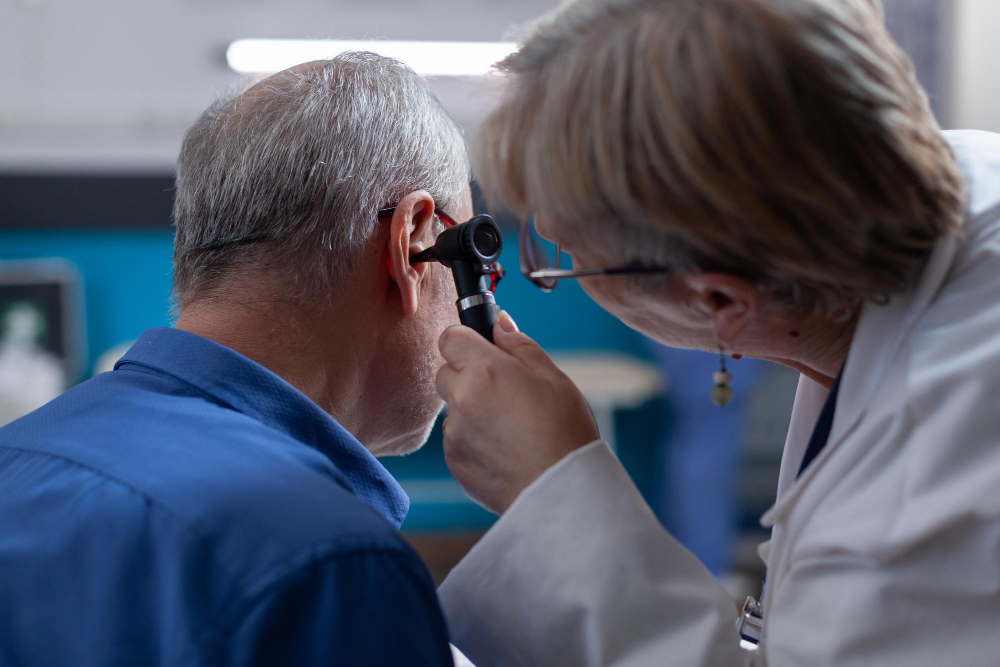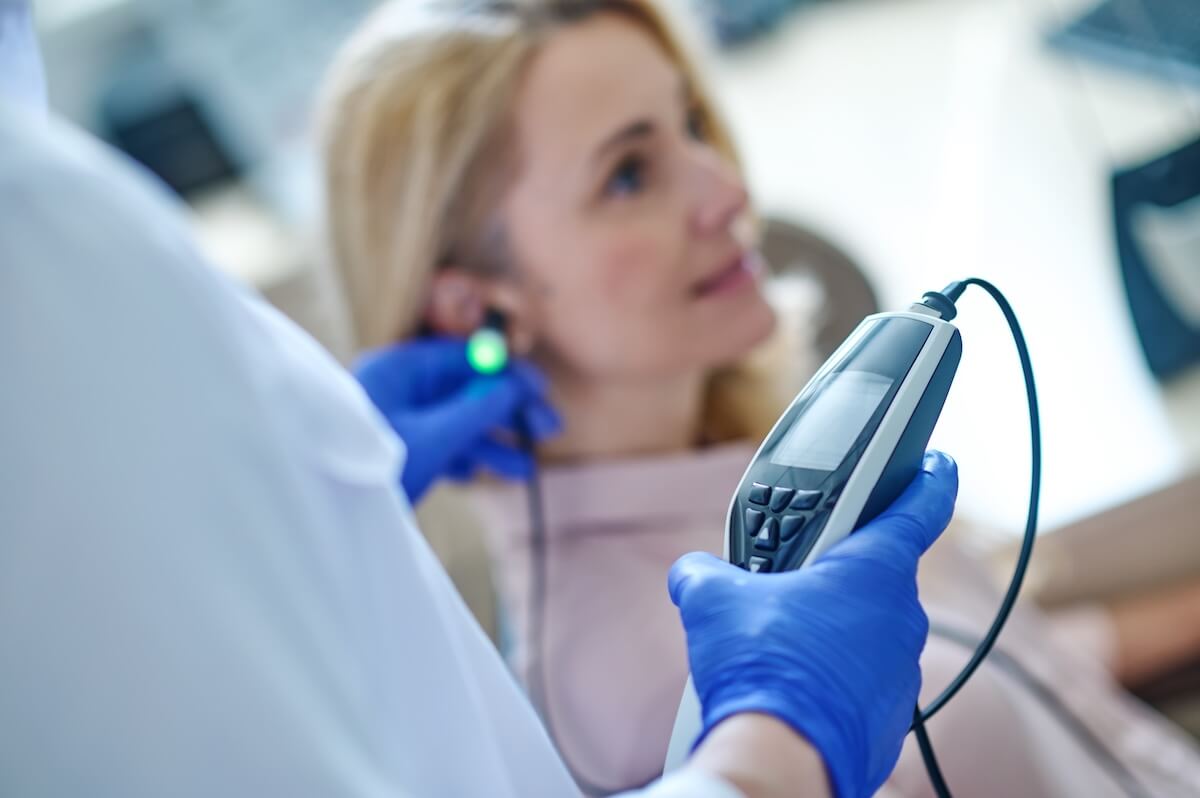What’s Stopping You From Booking a Hearing Test?
Why It’s Hard to Get Help for Hearing Loss — and How to Make It Easier

Getting help for hearing loss should be simple. But for a lot of people, it’s not that easy. Things like fear, cost, or simply not knowing what to expect can make it feel overwhelming.
Hearing loss is more common than most people realize. Around 15 percent of American adults report some trouble hearing, and that number jumps to over half for those over 75. The good news? Hearing loss is treatable — but many people still put off getting help. Waiting can lead to missed connections, safety concerns, and even changes in brain health. Early testing and treatment matter. The sooner hearing loss is detected, the more options people have for improving their quality of life.
The 3 key takeaways
- It’s common to delay hearing care due to stigma, cost, or simply not knowing where to start — but you’re not alone.
- Hearing loss often goes unnoticed at first, but early testing can protect your health, safety, and connection to others.
- Taking the first step is easier when you understand your options and find a provider you trust.
Barrier #1: Denial or Stigma Around Hearing Loss
One of the most common reasons people delay hearing care is denial. Many assume hearing loss only affects “older” people or believe their symptoms are not serious enough to warrant attention. Others might brush it off entirely, thinking, “It’s not that bad.” For some, the fear of needing a hearing aid is enough to avoid getting tested at all. But this delay can lead to years of missed conversations, strained relationships, and even cognitive decline.
Stigma plays a role, too. Some worry that using a hearing aid will make them seem old or out of touch, despite how common hearing loss really is. “There may be an emotional barrier to acknowledging the problem,” says Dr. Reisman, AuD. “Many people associate hearing loss with aging or fear the social stigma of wearing hearing aids.”
How to overcome it: Hearing care is part of overall health — just like getting your eyes or teeth checked. Helping people understand what to expect can ease hesitation. Today’s hearing aids are smaller, more advanced, and easier to use than ever. By promoting modern technology and encouraging regular screenings, we can help make hearing care feel like a normal, confident part of staying well.
Barrier #2: Lack of Awareness
Hearing loss doesn’t always happen all at once. For most people, it’s gradual — so subtle that you might not notice it until someone else does. That’s why many people delay getting help: they don’t realize anything has changed. Even when small issues pop up, it’s easy to blame the noise around you or assume that everyone’s just harder to understand lately.
There’s also confusion around where to go for help. Audiologists are medical professionals who diagnose and treat hearing loss. Hearing aid specialists focus more on fitting and selling devices. This distinction is not always clear to the public, and it contributes to misconceptions about how hearing care works. “People may not realize their symptoms are indicative of hearing loss,” says Dr. Reisman, AuD. “They might dismiss it as “people mumble”, “normal aging” or “just how things are now.” The truth is, they should be seen by an audiologist.
How to overcome it: Raising awareness starts with routine hearing screenings. These should begin around age 50, or earlier if you have risk factors like noise exposure or a family history of hearing loss. Doctors, employers, and social media can help make hearing health a regular part of everyday conversations. Public campaigns that explain the signs of hearing loss and what audiologists do can encourage people to seek help sooner.
Barrier #3: Cost and Insurance Challenges
For many people, the cost of hearing care is a major roadblock. Prescription hearing aids can cost thousands of dollars per pair, and insurance coverage isn’t always clear or guaranteed. While some plans cover diagnostic exams, hearing aids are often left out. This financial stress is especially hard for older adults on fixed incomes and for those without reliable insurance. Even people with workplace benefits may find the coverage confusing or face high out-of-pocket costs.
Without clear guidance, many delay care or assume it’s not in their budget — even when help is available. But when hearing loss goes untreated, it can continue to affect communication, work, and daily life.
How to overcome it: Start by checking what your insurance covers, including Medicare Advantage or Medicaid plans in your state. If you’re a veteran, student, or part of a union, additional benefits may be available. Some clinics offer payment plans to make hearing care more affordable. Over-the-counter hearing aids are also an option for mild to moderate hearing loss. Groups like the Hearing Loss Association of America (HLAA) can help you find financial aid and support better insurance coverage.
Barrier #4: Accessibility and Geographic Limitations
Even when someone is ready to seek help, finding an audiologist isn’t always easy. In rural areas, there may be no local providers — or long wait times for an appointment. If you don’t have reliable transportation or time off work, getting to an appointment can be hard. And for those with mobility issues, in-person visits may be difficult to manage.
Access can also be affected by language barriers, cultural differences, or simply not knowing how to take that first step. If you’ve never seen an audiologist before, the process can feel confusing or overwhelming.
How to overcome it: Expanded access starts with more flexible care options. Telehealth visits, mobile clinics, and walk-in screenings can make care easier to access. Some audiologists also offer virtual check-ins and remote device adjustments. Public health campaigns can also help bridge the gap by directing people to local providers and resources that meet their needs.
Pro tip: Use our Audiologist Explorer to find licensed professionals near you and book an appointment.
Barrier #5: Previous Negative Experiences or Mistrust
Some people avoid seeing an audiologist because of past experiences that left them feeling unheard or pressured. For example, they may have felt pushed toward expensive hearing aids they weren’t ready for — or that didn’t fit their needs. Others may not trust the healthcare system in general, especially if they’ve faced bias, financial exploitation, or unclear information in the past.
This mistrust can be deeply rooted and hard to overcome, especially when it involves something as personal as hearing. But it can also lead to years of untreated hearing loss — not because care isn’t available, but because trust has been broken.
How to overcome it: Choosing the right provider makes a difference. Look for audiologists with credentials from trusted organizations like the American Speech-Language-Hearing Association (ASHA) or the American Academy of Audiology (AAA). These professionals follow ethical guidelines and patient-centered care models that prioritize your needs, not sales. Ask questions, seek second opinions, and make sure you feel comfortable with the pace of your care plan. Shared decision-making is key — and you should never feel pressured to say yes before you’re ready.
Taking the First Step Toward Better Hearing
Addressing hearing loss can be life-changing. It can improve your relationships, boost your confidence, and help you stay connected to the people and activities you care about. Even small changes in hearing can have a big impact — and getting support early makes a real difference.
If you’ve been putting it off, now is the time to take that first step. A baseline hearing test is quick, painless, and gives you a clear picture of where your hearing stands today. Whether you’re ready for treatment or just gathering information, seeing an audiologist is a smart move toward protecting your hearing and your overall well-being.



